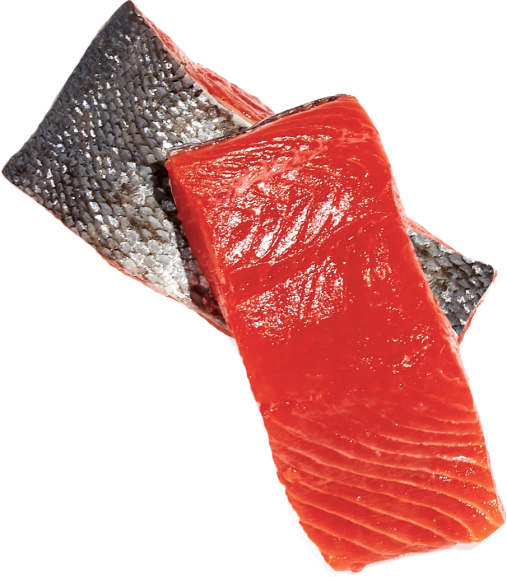While we may not be able to answer life’s many existential questions, we might help you decide whether salmon or chicken dog food is better for your pup.
Choosing between salmon and chicken as your dog’s primary protein source depends on a bevy of factors, so let’s explore them, shall we?
-
Nutrition
-
Digestibility
-
Allergy potential
-
Overall health benefits
The debate continues: Does salmon vs chicken dog food reign supreme? Really, it’s about catering to the unique needs of your special buddy. Which protein is a better choice for your dog? Let’s find out together.
While salmon and chicken both have their advantages, when making the choice for your dog, you want to take the following into account: your dog’s dietary needs, activity level, food sensitivities, and any new allergy symptoms (itching, scratching, ear infections) that might have arisen.
In this (hopefully helpful!) guide, we’ll compare salmon vs. chicken for dogs, helping you find the best fit for your pup.
Salmon vs. Chicken: The Protein Showdown!
When it comes to choosing the best protein for your pup, salmon and chicken are both top contenders, each bringing unique benefits to the table.
Both are packed with essential amino acids, vitamins and minerals, but the real difference lies in their protein content, fatty acids, and digestibility. Let’s break down how each excels in their own way?
Chicken — The trusty, lean powerhouse of the dog food world is high in protein and a favorite go-to for pups since the dawn of dog-food formulas.
But here’s the rub: Chicken has more omega-6 fatty acids, which, if not properly balanced, can stir up a little (or a lot) of inflammation.
Salmon — especially sustainably caught Atlantic Salmon like we use at Jinx — offers all kinds of protein-y goodness.
It's rich in omega-3 fatty acids (EPA & DHA — we’ll get to those later), which provide a super boost to your pup’s skin, coat, joints, and brain.
This next section contains some very handy information, boxed up special, just for you!
Protein Content & Quality
Top marks for protein! As the foundation of your dog’s diet, it does a lot of work in your pup’s body, handling it all with aplomb. Not only does protein build and maintain muscle, keeping your dog strong, it also acts as fuel, giving your pup energy for all their high-speed chases and neighborhood adventures.
Both chicken and salmon are rockstar protein sources (and by this we mean high-quality), but each brings its own unique blend of nutrients and extra perks to your dog’s bowl.
Protein Breakdown: Chicken vs. Salmon
|
Nutrient |
Chicken (per 100g) |
Salmon (per 100g) |
|
Protein |
~25g |
~22g |
|
Fat |
~3g |
~12g |
|
Omega-3s |
Low |
High (EPA & DHA) |
|
Omega-6s |
High |
Low |
Here’s an easy-to-digest summary of chicken vs salmon dog food:
Chicken is a lean, mean protein machine. It’s super for pups who need a high-protein, low-fat boost to stay fit and fabulous. It may come as no surprise that Jinx only uses the highest quality cage-free chicken in our dog-adored food, treats, and toppers!
Salmon is like a spa day for your dog. Packed with omega-3 fatty acids, it can fight inflammation and it’s especially helpful for pups dealing with skin issues or achy joints. Why give your dog anything less than top-tier protein? Depending on your dog’s dietary needs, Jinx sustainably caught Atlantic Salmon kibble comes with grain or grain-free. Both deliver just the right balance of protein and healthy fats to support your pup’s digestion and nutrient absorption.
Why Fatty Acids Are a Big Deal
You may be wondering, "What’s all the fuss about fatty acids, and what even are they?" Well, fatty acids are the healthy, essential fats. These little nutrients are like tiny warriors, helping maintain a strong immune system and keep inflammation in check. They also give your pup a shiny, show-stopping coat!
That said, there's a balance to strike between fatty acids omega-3s and omega-6s. Too much omega-6 can cause inflammation, while omega-3s work like nature's anti-inflammatory, keeping your dog’s system calm and comfortable.
-
Immune Booster – Helps your pup fight off icky sickness and unwanted illnesses.
-
Shiny Fur Alert! What dog doesn’t want softer, shiner strands of hair?
-
Later, Inflammation! – Once digested, they’re like your dog’s personal bodyguards.
-
Aids joint health – Keeps your pup’s joints flexible and ready for action.
-
Heart Helper – Gives their ticker the TLC it needs to run like clockwork.
So, next time you're choosing food for your dog, remember: A little fatty acid can work wonders for your pup’s body and well-being. Where to get all the fatty acid awesomeness? Why Jinx of course!
Why Omega-3s from Salmon Matter
Talk about a dynamic duo: Salmon’s omega-3 fatty acids, otherwise known as EPA (eicosapentaenoic acid) and DHA (docosahexaenoic acid) — forgive the technical terms! — are the tag team champs your dog needs to thrive.
As we’ve mentioned, these nutrients help reduce inflammation, boost skin hydration, and keep your dog’s joints moving and grooving (pain-free!) into their senior years.
What do each of these hard-working acronyms actually do?
-
EPA — Helps reduce inflammation and promotes healthy skin
-
DHA — A brain booster, supporting your dog’s cognitive function.
Now let’s get to know omega-6. While it’s also essential and known as a key nutrient in chicken dog food, getting the right balance of omega-6 and omega 3 is super important. Why? Too much omega-6 can tip the scale toward chronic inflammation, leading to itchy skin and irritation.
Getting the right mix of omega-3s and omega-6s — like you’ll find in Jinx’ chicken dog food — is definitely the way to go!
Oh, and what do you know, another handy table.
|
Fatty Acid Type |
Chicken |
Salmon |
|
Omega-3s (EPA & DHA) |
Low |
High |
|
Omega-6s |
High |
Low |
So there you have it. You’re now a veritable expert on salmon and chicken nutrition for dogs, armed with all the deets on omega-3s, EPA, DHA, and omega-6s.
Next time you’re caught in the salmon vs. chicken debate, you’ll have everything you need to decide for your pup.
Is Chicken or Salmon Easier for Dogs to Digest?
No one (human or dog!) wants to endure a constant stomach ache! When choosing the right protein for your pup, it really depends on how well they digest and tolerate it. If your dog seems miserable and is pooping up a storm, or having the opposite problem, that protein is probably not for them.
Dogs with food sensitivities, allergies, or chronic gut issues will likely need a protein that’s easier on their tummy. More often than not, that’s a “novel” protein like salmon, lamb, or even rabbit (Rabbit dog food, who knew!)
Back to salmon, it’s the most common novel protein. Not only is it naturally gentle on your pup’s tummy, it provides essential nutrients for gut repair. Really, you can’t find a better salmon kibble for dogs with sensitive stomachs than Jinx Grain-Free Atlantic Salmon Dog Food.
Some of you may be wondering, how do chicken and salmon stack up in terms of digestibility? Why is salmon better for dogs with food sensitivities? Let’s get into the dog-food protein nitty gritty.
Chicken
Lean & Dogs Love it — Known as a quality protein — especially the chicken in Jinx kibble which comes in two delicious formulas: Jinx Cage-Free Chicken Kibble with Brown Rice & Sweet Potato and Jinx Cage-Free Chicken, Sweet Potato & Carrot recipe. If your dog has minimal-or-no digestive issues, opt for kibble with grains. If your pup seems to have food sensitivities, go for a grain free diet.
Quick to Digest — With its light texture, chicken is quickly processed by your dog’s system, so they’re ready to walk and roll in no time!
Common Allergy Alert! — While most dogs tolerate chicken just fine, it’s also — get this — known as one of the most common allergens in dog food! Bummer. Some dogs, including yours, may develop a sensitivity to it over time.
For dogs who don't need special tummy care, chicken is a simple, reliable protein that gets the job done. And most dogs find it pretty darn tasty.
Salmon
Gut-Soothing Omega-3s — Salmon is packed with omega-3 fatty acids which help calm inflammation and keep digestion running smoothly. Think of it like a spa day (every day) for your dog’s belly. Even their stool might look healthier.
Gentler on Tummies — While it’s slightly higher in fat, salmon’s fatty acids are often more-easily tolerated by dogs with sensitive stomachs or chronic digestive issues.
Slow & Steady Wins the Race — Due to its higher fat content, salmon might take a little longer for your dog’s system to adjust to it, but the results are worth the wait.
For dogs who are prone to food sensitivities or tummy trouble, it can be a hypoallergenic hero!
Protein for Specific Dietary & Health Needs
Beyond allergies, different dog health concerns — such as skin issues, energy levels, and joint health — play a role in determining the best protein choice for your pup.
Food allergies in dogs are often triggered by common proteins like chicken, beef, or dairy. If your dog is experiencing any of the following, switching to a quality novel protein like Jinx sustainably caught Atlantic Salmon may be an excellent option!
-
Itching
-
Digestive issues
-
Chronic ear infections
If you decide to make the switch to salmon, be sure to transition gradually over a few weeks. We recommend combining chicken and salmon together in the first week, reducing chicken each day in favor of more salmon, to ensure your pup tolerates it better.
To wrap up this oh-so-tasty comparison between chicken and salmon dog food, let’s run through the highlights:
Chicken is lean, easy to digest, and a super option for pups without allergies or sensitivities. If your dog has frequent digestive issues or skin problems, they may need to steer clear of chicken.
Salmon is a naturally hypoallergenic dog-food protein, packed with gut-supporting omega-3 fatty acids — perfecto for dogs with food sensitivities. It may take a bit longer to digest because of its higher fat content, but it’s a real soother of sensitive stomachs.
If you’ve read this far, you’re officially in-the-know when it comes to choosing protein for your pup!
FAQs
Is salmon a better option for my dog with allergies?
Yep, salmon could be your dog’s new best pal if allergies are a concern. It's less likely to cause uncomfortable reactions compared to chicken, and those omega-3s work wonders for itchy skin and upset tummies. Plus, it’s great for gut health, so your dog’s belly can finally get some peace.
When is chicken still a good choice for my dog?
If your pup is allergy-free and does well with chicken, it’s still a solid pick. It’s full of lean, quality protein, which is great for active pups who need extra fuel, fast. If chicken seems to be working, stick with it! Just keep an eye out for allergy symptoms (itchy skin or ear infections) that could develop over time.

